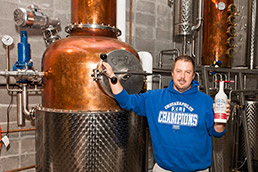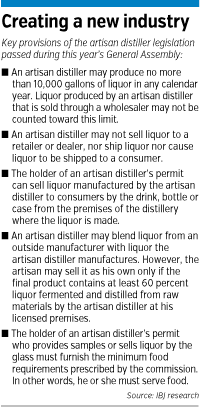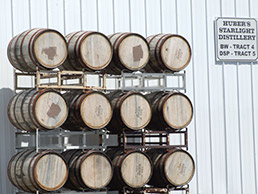Subscriber Benefit
As a subscriber you can listen to articles at work, in the car, or while you work out. Subscribe NowHeartland Distillers, one of a handful of Indiana-based small-scale distilleries, spent most of the years since its 2008 founding hiding in a nondescript northeast-side strip mall.
Owner Stuart Hobson even took down the sign on the front door when people started dropping in, inquiring about tours or asking to purchase the company’s signature small-batch vodkas and gins.
 Heartland Distillers owner Stuart Hobson plans a downtown tasting room now that Indiana law allows micro-distilleries to sell directly to the public. (IBJ photo/Eric Learned)
Heartland Distillers owner Stuart Hobson plans a downtown tasting room now that Indiana law allows micro-distilleries to sell directly to the public. (IBJ photo/Eric Learned)For most businesses this would be good news, but for him it could have spelled big-time legal trouble.
“We couldn’t sell it to them and they always left disappointed,” Hobson said. “So we scraped the name off the door and went incognito.”
Today, he’s contemplating putting the name back up, thanks to a new state law that went into effect in July.
Formerly, Indiana distillers could sell only to distributors, never to the public. Now, an already-licensed brewery, winery or distiller can obtain a permit to produce and sell spirits by the glass, bottle or case. The new rules could kick-start an Indiana-based micro-distilling industry, as both established players and startups prepare to enter the market.
 “This is really about expanding business opportunities,” said state Rep. Ed Clere, a New Albany Republican who championed the legislation. “It’s already leading to business expansion around the state.”
“This is really about expanding business opportunities,” said state Rep. Ed Clere, a New Albany Republican who championed the legislation. “It’s already leading to business expansion around the state.”
Hobson revamped his own strategy based on the new law. He’s in the early stages of planning for a downtown production facility, complete with tasting room.
“This definitely changed our direction,” he said. “Without this legislation, we would have moved from one anonymous warehouse building to another, slightly larger, anonymous warehouse building. Now, we’re looking at locations we wouldn’t have considered before.”
Sun King Brewing Co. also is bullish on a high-proof future. It plans to procure its own craft distilling permit, already has bought a new still, and will “definitely” open a tasting room, co-owner Omar Robinson said.
Robinson said the plans include creating artisanal spirits distilled from some of the 35 to 40 craft beers Sun King already produces yearly.
“We’re not going to fight Maker’s Mark and Smirnoff,” Robinson said. “We just want this little corner of the market for people who want something really, really high-quality and different.”
Gaining steam
Over the years, Robinson and his partners have watched craft distilling gather steam in places such as Oregon and Washington state. The American Distilling Institute counted a mere 69 craft distillers in 2003. That number has since risen to some 400 in North America, but there’s still plenty of room for newcomers.
 The new law could be a boon for Huber’s Orchard, Winery & Vineyards, which has created an entire line of brandies made from blueberries, raspberries and apples. (Photo courtesy of Huber’s Orchard, Winery & Vineyards)
The new law could be a boon for Huber’s Orchard, Winery & Vineyards, which has created an entire line of brandies made from blueberries, raspberries and apples. (Photo courtesy of Huber’s Orchard, Winery & Vineyards)“I think you’ll see a wave of 12 to 15 people get into it the first year [in Indiana],” Robinson said. “Then it will slow down a little, and then you’ll see a second wave. I think you’ll see 30 or 40 facilities here in the next five years.”
It’s quite a change of fortune for Sun King, which a few years ago tried to partner with a conventional distiller, only to learn such a linkup was illegal under Indiana law at the time. Undaunted, the company began pursuing a legislative solution, pushing for passage of the micro-distilling bill in this year’s session.
The company helped sway lawmakers with the cautionary tale of Journeyman Distillery, owned by longtime Valparaiso resident Bill Welter.
“He wanted to start a distillery in Indiana, but he couldn’t do it,” Robinson said. “Today, he still lives in Valpo, but he built his distillery across the border in Michigan. The first year he was in business, between real estate, excise and sales tax, he paid the state of Michigan a quarter of a million dollars for his distillery.”
Not that Indiana’s new law isn’t without its oddities. Selling bottles is illegal on Sunday, which means that tourist-intensive operation can’t offer their wares during one of their two biggest business days. The law also mandates that distilled spirits tasting rooms serve food. Weirdly specific food, such as sandwiches, hot soup, hot coffee and milk.
“We will not start a restaurant. Maybe we could have canned milk, instant coffee, a bunch of pizzas beside a microwave oven,” Robinson said. “We could meet the food requirement and hope nobody ever buys it.”
Another of the law’s foibles is the requirement that applicants hold a brewery, winery or conventional federal distilling license for three years before being eligible for the craft-distilling permit. That’s no problem for established players such as Sun King, but spirits entrepreneurs call it a blatant barrier to entry.
“This law was really written by brewers and winery guys,” said one such entrepreneur, who asked for anonymity. “It gives a significant advantage to anyone who has an existing brewery or winery.”
There is one small opening. The new law states that anyone obtaining a conventional federal distilling permit in 2013 is immediately eligible (with some restrictions) for the state’s craft distilling permit. While there’s a bit of 2013 left on the calendar, the convoluted, exacting application process moves so slowly that it’s already effectively too late to begin.
Clere, to no surprise, thinks the three-year wait for future applicants is good public policy. He said it weeds out those not “serious” about the effort.
“We wanted to be sure that anyone receiving the privilege of offering tastings and direct sales would have proven themselves as responsible operators,” he said. “It doesn’t keep them from distilling. They only need the regular distiller’s permit for that. They just have to wait three years to receive the additional permit.”
Preparing for launch
One distiller that made it in under the wire—and whose predicament inspired Clere to add the 2013 exception—is Cardinal Spirits LLC, a Bloomington operation that plans to open its doors in mid-2014.
Co-owner Jeff Wuslich and his four partners originally planned to start a conventional no-customers-allowed distillery, with the hope that someday the laws would change. They misjudged how soon “someday” would arrive.
“We always knew there’d be retail sales in Indiana,” Wuslich said. “We didn’t think it would happen this quick.”
The distillery, in a former sheet metal factory, will cost about $1.5 million, about $850,000 of which was raised from investors. Wuslich said Cardinal plans to serve gins, vodkas, liqueurs and, a bit further down the line, aged whiskeys. How far down the line is up to the whiskey.
“We’ll offer it when it’s ready,” he said.
Another startup in a similar situation is Hotel Tango Whiskey, which plans to offer vodka, gin, moonshine and whiskey at 702 Virginia Ave., starting in the fall of 2014.
That’s slightly sooner than its five founders anticipated. The owners, all new to the industry, had to advance their timetable to qualify for the fast-tracked artisan permit. Since the spring, they’ve formed an LLC, lined up a building, installed a still, become bonded and insured—and met many other requirements.
“The application required us to put the cart before the horse,” said one of the project’s partners, attorney Travis Barnes. “We knew that time was of the essence and that we had this one shot at getting a liquor permit without holding a brewing permit for three years.”
Hotel Tango Whiskey expects to get the OK for its federal distilling permit any day, clearing the way for it to apply for its artisan permit.
In spite of the last-minute theatrics forced upon him by the new rules, Cardinal Spirits’ Wuslich thinks that in some ways the Indiana law is quite progressive. For instance, it requires a craft permit holder to distill at least 60 percent of its product from raw materials at the permitted facility.
Clere figures this will help create added value for Indiana grain, a good deal of which is currently shipped to Kentucky for use in creating a certain amber-colored beverage. It also will ensure the “artisan” moniker actually means something.
“You can’t just truck in a tanker full of neutral spirits from out of state and flavor it and call it an artisan spirit,” he said. “It has to be something that was actually made in Indiana.”
Branching out
Getting homegrown ingredients won’t be a problem for Huber’s Orchard, Winery & Vineyards, a southern Indiana tourist fixture that draws some 600,000 visitors a year.
The decades-old operation offers everything from Christmas trees to strawberries, but until recently it couldn’t offer distilled spirits. Or rather, most of them. In 2001, co-owner Ted Huber landed the state’s first (and, so far, only) permit to distill brandies.
He’s since created an entire line made from site-grown blueberries, raspberries and apples. Over the years, he also has experimented with whiskeys and other spirits, but could never offer them to the public.
“We always wanted to branch into the vodka market, and gin and whiskeys,” Huber said. “It took us many years to convince the General Assembly.”
The farm plans to expand its distilling facilities, offer tours and (once a newly ordered, larger still arrives) produce new products in a big way.
But though his enthusiasm for the new enterprise is palpable, Huber doesn’t expect a tidal wave of equally enthusiastic competitors. For one thing, it takes a great deal of cash to get in the game. A very small still costs around $50,000, a middling one goes for hundreds of thousands, and a really big one can cost millions.
“It’s a much bigger capital investment than starting a brewery,” he said.
And there’s another component—time. While craft beers (and vodkas and gins) can be produced relatively quickly, bourbons and high-quality whiskeys exist on a time scale measured not by clocks, but calendars.
Huber, for instance, already is producing some bourbon, but most of it won’t even be examined or tested for two to four years. Some will be put away for seven years of aging. Which is par for the course at his operation.
‘When we started our brandy facility, it was four years before we started blending down the first barrel,” Huber said. “And it was almost five years before the first brandy we ever made hit the market.”
Though some of their products won’t see the inside of a glass or bottle for years, micro-distillers think they’ll eventually see a big payoff from getting in early.
“We’re probably right now at the beginning of an explosion in the distilling industry,” Robinson said.•
Please enable JavaScript to view this content.
